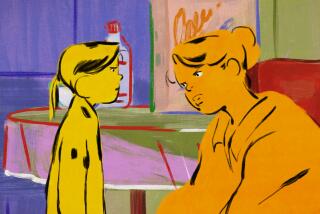Reviews: Animated drama ‘Liz and the Blue Bird,’ plus ‘Say Her Name: The Life and Death of Sandra Bland’ and more documentaries
‘Liz and the Blue Bird’
“Liz and the Blue Bird” is a feature spinoff of the animated shojo (girls) series “Sound Euphonium,” about the musicians in a top high school concert band.
Flautist Nozomi and oboist Mizore are best friends, but when they have to share a difficult solo in a piece based on the fairy tale “Liz and the Bluebird,” their friendship is called into question. Mizore identifies with the lonely, hardworking Liz; they both see Nozomi as the bluebird who represents freedom.
Can they resolve their conflicted feelings, musically and personally, amid the stress of the approaching end of their senior year? And can they do it in time for their performance to win the upcoming musical competition?
Viewers unfamiliar with “Sound Euphonium” will find the lead characters underdeveloped. Perky Nozomi chats with the other girls, but rarely says anything interesting. Dreary, withdrawn Mizore rejects invitations from everyone except Nozomi, who is the center of her world. Director Naoko Yamada repeats shots of the characters walking, often showing them only from the knees down, which lends little visual interest to the story and fails to energize the leaden pacing.
The sequences illustrating the fairy tale are rendered in a handsome water color style, but even these scenes feel too slow and deliberate to enliven the film. “Liz and the Blue Bird” may appeal to fans of “Sound Euphonium,” but many recent Japanese features have dealt with teen friendships and angst in more interesting ways.
— Charles Solomon
‘Liz and the Blue Bird’
In Japanese with English subtitles; English dub in selected theaters
Not rated
Running time: 1 hour, 30 minutes
Playing: Starts Nov. 9 in limited release
-------------
‘Say Her Name: The Life and Death of Sandra Bland’
Police killings of unarmed black Americans have become the kind of civic scourge that creates a uniquely terrible swirl of outrage and grief, especially when there appears to be no concurrent thirst for accountability or change from authorities. Politically outspoken 28-year-old Sandra Bland’s mysterious death by hanging while in the custody of sheriff’s department officials in Waller County, Texas, is one of the stranger, sadder and more maddening instances of needlessly snuffed-out life.
A new documentary about the incident, “Say Her Name: The Life and Death of Sandra Bland,” provides the perspectives of Bland’s stricken mother and sisters, their impassioned attorney Cannon Lambert and soft-spokenly defensive local law enforcement.
How does being pulled over for a lane change lead to an arrest, bruises, jail isolation and an officially ruled suicide? It’s still hard to say, but the evidence of custodial neglect, incompetence and officials’ spurious assumptions about Bland — coupled with her life as a frequent poster of civic-minded, call-to-activism video monologues about race relations — gives the movie’s depiction of the case a not-so-subtle air of racially charged malfeasance.
With the family, filmmakers Kate Davis and David Heilbroner are dutifully sensitive in the manner of a solemn PBS doc, but there’s little pushback in the interviews with the good ol’ boy sheriff and Stetson-wearing district attorney, which plays oddly. “Say Her Name” doesn’t have answers, but it does re-emphasize how unnecessarily tragic Bland’s death was, and why her name should be a boldfaced one in the nationwide call for police reform.
— Robert Abele
‘Say Her Name: The Life and Death of Sandra Bland’
Not rated
Running time: 1 hour, 42 minutes
Playing: Starts Nov. 9, Laemmle Monica Film Center, Santa Monica; also on HBO, Dec. 3
-------------
‘They Fight’
“It’s my job to keep these little guys in the gym so they won’t end up like me,” says Coach Walt, a recovering addict who emerged from an extended prison stint to provide guidance to Southeast D.C. teens taking part in an afterschool boxing program.
Their stories form the impetus of “They Fight,” a slender but affectingly penetrating documentary by Andrew Renzi, based on the Washington Post article, “It Ain’t All About Boxing,” by Michael Minahan.
While the Lyfe Style Boxing Club affords young, ambitious Quincey Williams and Ragahleak “Peanut” Bartee, who won six national titles before he turned 15, a safe-haven opportunity to pursue their dreams, it also symbolizes a second chance for their coach, a tough but tender father figure whose own son was murdered.
Chronicling their journey to the 2017 Junior Olympics, where Quincey attempts to defend his title and Peanut is intent on avenging his first loss in four years, the film, which will also be airing this weekend adjacent to regional Fox Sports NFL broadcasts, has as much to say about personal conflicts as those taking place in the ring.
Although Renzi’s subjects might not achieve the triumphant results they were aiming for, “They Fight,” produced by Common and energized by an inspirational hip-hop soundtrack, serves as a vital reminder that often the battle can be more important than the inevitable outcome.
— Michael Rechtshaffen
‘They Fight’
Not rated
Running time: 1 hour, 12 minutes
Playing: Starts Nov. 9, Laemmle Glendale; also airing on Fox
-------------
‘The First Patient’
This documentary about medical students’ work with cadavers begins with a (necessary) disclaimer: some of the moments in “The First Patient” may be too graphic for some viewers. But underneath the layers of formaldehyde-treated flesh, there’s real heart and deserved wonder at the human body.
Director Chip Duncan introduces the audience to his subjects: the diverse students in their first dissection class at the Mayo Clinic School of Medicine and their instructors. With their different backgrounds and motivations for being there, each brings something unique to the dissection table and their cadaver. “The First Patient” explores each part of the process, beginning with their initial reactions to the bodies to their final exams in the lab.
That lab prohibits food and drink, and this documentary is probably best not paired with concessions. Beyond the unsettling idea that the cadavers were once living, breathing people with emotions and relationships, there are some genuinely gross moments that are likely to be too much for more squeamish audiences. However, “The First Patient” and the students always treat the donated bodies with real reverence and awe.
Where Duncan’s documentary falters is in its inconsistent, sometimes goofy use of graphics. His narrative is strong enough to stand on its own, and it doesn’t need these interruptions. He has made a film that argues for the enduring importance of this experience and of the donors’ sacrifice, even as technology might make it unnecessary.
— Kimber Myers
‘The First Patient’
Not rated
Running time: 1 hour, 22 minutes
Playing: Starts Nov. 9, Laemmle Monica Film Center, Santa Monica
-------------
‘Philosopher King’
It’s not every day you see a fictionalized documentary about a suicidal Japanese student who’s schooled in Taiwanese political history by the spirit of the former president of the Republic of China, Taiwan-born Lee Teng-hui.
And Hideto Sonoda’s “Philosopher King” handily demonstrates why there haven’t been more of them.
Meet Momoka (Maria Yamaguchi) the despondent teen in question, who feels she can no longer go on living in a world filled with despair and fear while also making the decidedly timely observation that “nationalism is egotism that justifies self-protection.”
Fortunately, a last-minute intervention arrives from the heavens in the unseen form of Lee (voiced by Masaki Terasoma), or rather, a “self who is not myself,” who initiates a dialogue with Momoka pertaining to Taiwan’s complex past relationships with Japan and China and his own personal philosophical and religious pursuits.
While Sonoda’s intention may have been to enliven the standard history lesson by incorporating wispy poetic visuals assisted by computer-animated watercolors and a yearning score alongside the usual archival footage, array of learned talking heads, and, ostensibly, Lee’s own words (the man himself, incidentally, is still alive and well at age 95), the upshot never coalesces into a convincing whole.
Instead, the jumble occupies an unfortunate space situated somewhere between the ponderously pretentious and the just plain ridiculous.
— Michael Rechtshaffen
‘Philosopher King’
In Japanese and Chinese with English subtitles
Not rated
Running time: 1 hour, 37 minutes
Playing: Starts Nov. 9, Laemmle Music Hall, Beverly Hills
-------------
‘3100: Run and Become’
To most, any 3,100-mile running race is grueling beyond comprehension, but 3,100 miles repeated around the same half-mile city block takes a different level of mental discipline. The documentary “3100: Run and Become” explores the spiritual connection between repeated footfalls and meditation, following four runners on journeys that challenge body and mind.
Director Sanjay Rawal focuses primarily on Ashprihanal Aalto, a 45-year-old long-distance runner who finds solace in both the teachings of Sri Chinmoy and the 3,100-mile race Chinmoy created on a block in Queens, N.Y. With just 52 days to run thousands of miles, Aalto and a small group of fellow devotees must circle the same block more than 100 times each day to reach their goal. To supplement Aalto’s story, Rawal also spends time with runners on the Navajo Nation reservation, around Mt. Hiei in Japan and in the Kalahari desert.
Rawal’s well-shot film is engaging — particularly for those with an interest in running and/or meditation — but the lack of balance between each of the four stories ultimately throws the film off. Choosing to focus exclusively on Aalto and his fellow 3,100 runners may have allowed audiences to experience more of their struggles, or offering more equality in the coverage may have made the film more purely about running and its relationship to spirituality.
— Kimber Myers
‘3100: Run and Become’
Not rated
Running time: 1 hour, 19 minutes
Playing: Starts Nov. 9, Laemmle Monica Film Center, Santa Monica
-------------
See the most-read stories in Entertainment this hour »
Movie Trailers
More to Read
Only good movies
Get the Indie Focus newsletter, Mark Olsen's weekly guide to the world of cinema.
You may occasionally receive promotional content from the Los Angeles Times.






